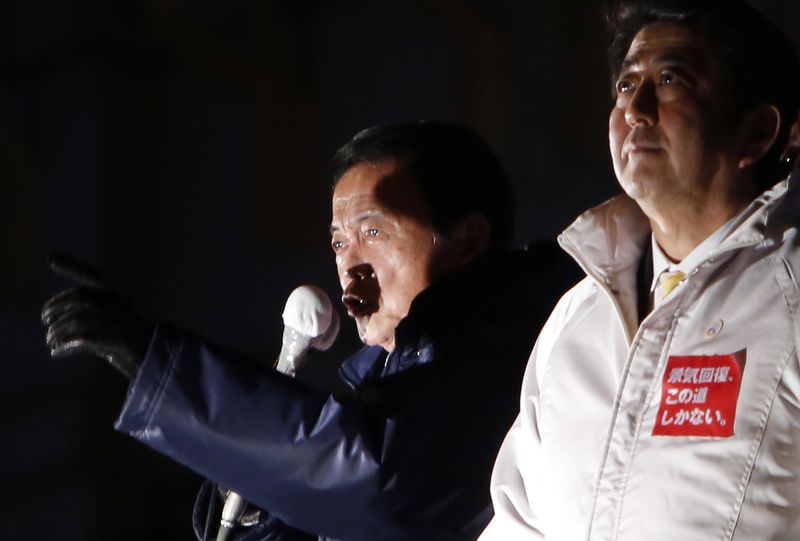By Linda Sieg and Antoni Slodkowski
TOKYO (Reuters) - Prime Minister Shinzo Abe's party looks set for a huge win in an election on Sunday that will allow him to claim a fresh mandate for his reflationary policies to revive Japan's economy, although voter turnout appeared headed for a postwar record low.
Abe has cast the snap election as a referendum on his "Abenomics" strategy to end deflation and generate growth. Media exit polls, which have proved reliable in the past, will come out at 8 p.m. (6 a.m. EST).
The conservative leader called the vote after just two years in office in a gamble originally seen as potentially costing his party seats. But media projections have said his long-dominant Liberal Democratic Party (LDP) could win more than 300 seats in the 475-member lower house, possibly its biggest victory since its founding nearly six decades ago.
Together, the LDP and its junior partner are forecast to keep their two-thirds "super-majority".
Experts cautioned before the election that any mandate for Abe might be smaller than it first appears since disaffected voters who are increasingly dubious of Abenomics but wary of the opposition could stay home in large numbers.
At 2 p.m., voter turnout was 22.7 percent, down almost 5 percentage points from the same time in the last general election in 2012, government data showed.
Turnout hit a postwar record low of 59.3 percent in that poll, which saw Abe return to power for a rare second term on pledges to reboot an economy plagued by deflation and an aging, shrinking population.
"This is not so much a vote of confidence in Abe and the LDP as a vote of no-confidence in the political opposition," said Columbia University professor Gerry Curtis.
FRAGILE ECONOMY
Hopes for Abe's "Three Arrows" of hyper-easy monetary policy, government spending and reforms such as deregulation were tarnished after the economy slipped into recession in the third quarter following an April sales tax rise. Recent data suggest any rebound is fragile.
Abe decided last month to put off a second tax hike to 10 percent until April 2017, raising concerns about how Japan will curb its huge public debt, the worst among advanced nations.
"I worry that Japan's public finances will get even worse," said Akihiro Fujihara, 38, who planned to vote later on Sunday.
"I wish there was a party out there that would come up with actual proposals to make Japan a better place to live."
Media forecasts suggest the main opposition Democratic Party of Japan (DPJ) has been unable to gain traction, largely due to voters' memories of a 2009-2012 rule plagued by policy flip-flops, infighting and three premiers in three years.
Abe called the election in a bid to strengthen his grip on power before tackling unpopular policies such as restarting nuclear reactors taken off-line after the 2011 Fukushima disaster and a security policy shift away from post-war pacifism.
The expected LDP victory could make it easier for Abe to be re-elected in a party leadership race next September, boosting the chance he stays in power through 2018 and becomes one of Japan's rare long-term leaders.
Aside from local elections in April, his coalition will probably not need to face voters until a 2016 election for the upper house, where the LDP and the Komeito party now hold a majority.
"If Abe wins big, he will at least have a free hand on policy until the 2016 upper house election," said Hideyuki Ishiguro, senior strategist at Okasan Securities.
TOUGH REFORMS
Doubts, however, persist over whether Abe will knuckle down on his "third arrow" of reforms in politically sensitive areas such as labor market deregulation that would make it easier to shift workers to growth areas but also to lay off employees, and reform of the highly protected farm sector.
Critics say progress has been limited, partly due to opposition from members of Abe's own party.
"My personal assessment is that we are likely to see more of what we've seen - piecemeal reforms moving more or less in the right direction, but at a fairly slow clip and no bold breakthroughs because of this election," Curtis said.
Some experts say Abe could also turn attention away from the economy to his conservative agenda that includes laying the groundwork to revise the post-war, pacifist constitution and recasting Japan's wartime past with a less apologetic tone.
That agenda raises hackles in China and South Korea, where bitter memories of Japan's past militarism run deep.
The LDP had 295 seats and Komeito 31 in the 480-member lower house when it was dissolved for the election. The DPJ had 62 seats heading into the poll. Five seats were cut through electoral reform.
(Additional reporting by Thomas Wilson; Editing by Dean Yates)
